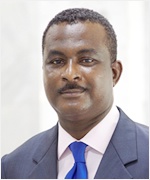
Government is banking on private sector participation in the proposed Ghana Infrastructure Fund as it commits an initial capital of GH¢745million from the 2.5 percentage-point increase in the Value Added Tax (VAT).
The portion of petroleum receipts used for debt amortisation and infrastructure development will also be committed to the fund.
Deputy Minister of Finance and Economic Planning Kweku Ricketts-Hagan told the B&FT that private sector participation is key because government does not have the funds to finance all the projects by itself.
“Government hasn’t got the money to take all the risks itself. That is why we want to bring in private sector money and also pass some of the risk in infrastructure development to the private sector. The beauty about the infrastructure fund is that government will put in money from the 2.5 percent VAT, but that is to pull in the private sector to be able to come in and invest,” he said.
He was speaking at an advocacy programme organised by the Institute of Financial and Economic Journalists (IFEJ) and the Ministry of Finance on the 2014 budget presented to Parliament last week.
The modalities for operating the fund are still being finalised to clarify the scope of private sector participation.
“Some of the modalities and structures are being put in place -- and once that is done and presented to parliament for approval, we will be clearer as to how this is going to be. The fund will have its own ratings and will be able to borrow on its own balance sheet,” Mr. Ricketts-Hagan said.
Government in its 2014 budget presented to Parliament last week proposed to set up a Ghana Infrastructure Fund (GIF) to deal with the huge infrastructure deficit and to focus on strategic infrastructure that will lead to job-creation and increase growth of the economy.
Conservative estimates indicate that the country’s huge infrastructure deficit requires sustained spending of at least US$1.5billion per annum over the next 10 years to address the shortfall.
The deficit covers all the main infrastructure areas: roads, energy, water, aviation, housing, and ICT.
The GIF, according to the 2014 budget, will be a quasi-fiscal body chaired by the Minister of Finance and will pursue its own ratings on the domestic and international financial and capital markets.
Adu Anane Antwi, Director-General of the Securities and Exchange Commission (SEC), in an earlier interview with the B&FT indicated that private sector participation is crucial for the fund to achieve its purpose.
“This is a good proposal. There is a need to have such large funds for our infrastructure development since government borrowing alone cannot do that -- because we would end up borrowing to the excess limit which would not be sustainable,” he said.
“We believe that government will invite international financial institutions to team up in partnership, probably in the form of equity, so that the company can be owned by government and these financial institutions and be able come to the market and raise bonds for developing infrastructure in the country.”
The intention of government in setting up the GIF, Finance Minister Seth Terkper said, is to consolidate the use of commercial financing facilities to finance projects that can repay commercial loans which government contracts directly or guarantees.